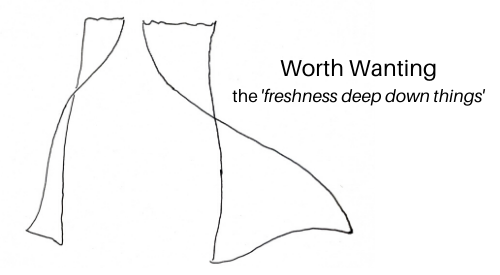
Social darwinism is a ultimately a dyadic worldview: one (me or us) against other(s) (it or them). As a worldview, it is a set of convictions about ultimate reality (what it consists of and how it works) and ultimate value (what has worth and what is good to do.)
It’s not hard to assemble compelling reasons for thinking the social darwinist world view is true: risks are real; threats are real; loss and death are real; and competition is a familiar feature of our world and our existence. So it must be that conflict is the fundamental fact of reality, and that prevalence in some form is the ultimate value.
Dyads have exclusionary tendencies. First, everyone or everything else not in the dyad tends to be ignored, and second, the context of common concerns, the common ground tends to shrink.
Social darwinism, of the dyadic world views, tends particularly to amplify both tendencies in a way that is self-reinforcing, so the better we are as predators, the better you look to us as prey.
The preyed-upon can pray, of course, but often that too is seen as a dyadic relationship: a deity, say, and I working on improving our relationship apart from what the rest of the world is up to (often what is thought to represent the ultimate unit of value), or else, the people of my conviction defending against all the rest of the unconvinced (or unconvincibles) of the world. To ignore others or to oppose them, or do both, are the most commonly available choices in dyadic world views.
This is why it’s difficult to make a case for democratic pluralism using dyadic thinking: there’s no room for a third party, either beyond or between the other two. It’s easy to think of cooperation between two who share a common world view, as opposed to others that don’t, but it’s hard to include those who don’t, who are able to insist or resist (and often do so), and yet have to be, have a right to be, part of the discussion if the pluralism is to be democratic. Common concerns have to seen as common and concerning, and are sometimes not. What kind of thinking has the necessary forebearance built into it? And without condescension? Not either/or dyadic thinking.
A triadic world view avoids this dilemma. The presence of a third party, independent of the others, is able to create a dynamic that counters the centripetal or imperial tendencies that exist in just-two-of-us relationships. According to such a view, cooperation or even communion is the fundamental reality, and making common cause with the other the core value.
Mutual independence, or otherness, of all parties is key to a triadic interactions, but what might thatpf third party be if part of a world where conflicts enlist or ensnare or subvert all neutral parties?
Transcendent freshness is a good candidate, uninvolved in the particular motives and agendas of the mundane world, but deeply interested in encounters, that is, occasions of one making common cause with the livingness of an other, addressed as you, as elements of its transcendent world.
So whereas regard for the outsider may be a next-step consequence in a dyadic relationship, it’s an integral condition of a triadic one, especially if transcendent freshness is the third party. This can be the basis of a defense of dynamic pluralism.
Of course, we human beings have always had encounters, without thinking of them as such, in which generosity, bravery and non-complicit, non-exclusive loyalty have been manifest. These are to be proud of, and their memory cherished. However, well-wishing people have a problem making the general case for their personal propensities without falling into dyadic thinking which tends to emphasize conflict. And the fears and angers that all conflicts generate can overwhelm the thinking process, a vicious cycle.
It’s hard to imagine a triadic world view without some transcendence beyond the reach of mundane machination, and it’s hard to argue for democratic pluralism without a triadic world view.
